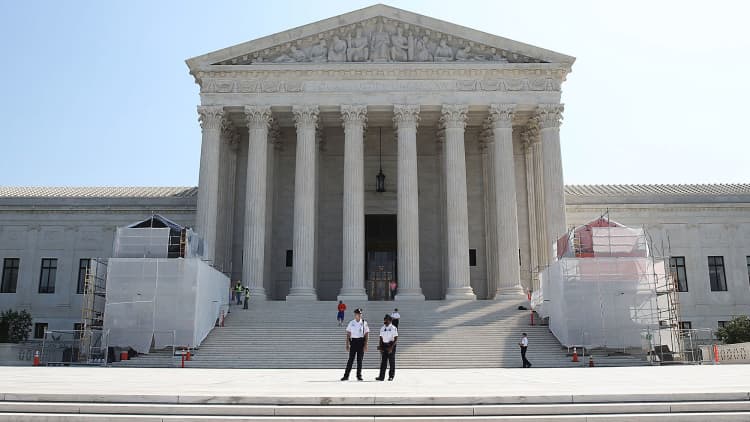How will the Ninth Circuit Court of Appeals rule on one of the most continuous issues of a polarizing White House?
Though the question before the three-judge panel is a simple one — should they let the government enforce the Trump travel restrictions or not — the court has some options beyond a straightforward yes or no.
On Wednesday, a court official said the ruling would come Thursday or later, and the court would provide at least an hour notice of the ruling.
"We appreciate the importance and the time-sensitive nature of this matter and will endeavor to reach our decision as soon as possible," said Judge Michelle Friedland at the conclusion of the arguments.
More from NBC News:
Trump claims SCOTUS pick's criticism was misrepresented
Trump moves leave LGBTQ groups, conservatives wary
DNC chair hopeful pledges to woo red, rural America
The Justice Department, on behalf of the White House, has urged the court to lift an order imposed February 3rd by a federal district court judge in Seattle.
That order, issued by Judge James Robart, temporarily stopped enforcement of all the Trump travel restrictions. Robart had in response to a lawsuit filed by two states, Minnesota and Washington, who claim the restrictions are harming their residents and economies.
While lawyers for both sides are preparing to argue before Judge Robart in mid-February about the legality and constitutionality of the Trump policy, he issued the order "to preserve the status quo before the court holds a hearing" on those underlying legal issues.
But the appeals court must currently decide who would be harmed more: The government by keeping enforcement of travel restrictions on hold for now, or the states by letting the Trump admin policy take effect?

During Tuesday's oral argument, Ninth Circuit Judge Richard Clifton asked the government lawyer, "Is there any reason for us to think that there's a real risk" if the executive order was put on hold?
"Well, the President determined that there was a risk," responded Justice Department lawyer August Flentje. He suggested courts cannot second-guess a president's determination about the need to restrict immigration in the interest of national security.
Arguing for the states, Washington Solicitor General Noah Purcell said, "We had students and faculty at our state universities who were stranded overseas. We had families that were separated. We had long-time residents who could not travel overseas to visit their families without knowing that they would be able to come back."
Flentje suggested a compromise.
The court could let the government resume enforcing most of the travel restrictions, but exempt people from the seven countries covered by the executive order who have already obtained visas and have come to the U.S. That could limit the temporary travel ban, the government argued, since it would cover only those who wish to get visas for the first time.
"At most the injunction would be limited to the class of individuals on who the states' claims rest," he said.
That would provide some measure of success for both sides. But the Washington state challengers insist the entire order is unlawful, and that the fairest approach is to keep the entire order blocked while the lower court rules on the merits.
Purcell, the Washington state lawyer, reminded the judges that because Washington won the first round in the lower court, the legal burden is now on the Justice Department to prove why that judgment should be overturned.
While the hearing's only practical impact will be whether to leave or lift the temporary pause on the immigration order, the judges also probed wider issues in the case that are sure to arise in future hearings.
The judges pressed the challengers on whether they have firm "standing" — in layman's terms, the right to sue — when they represent a state government, rather than individual citizens.
And they pressed the Justice Department on a core controversy in the dispute: whether the order operated to discriminate against a specific religion, Islam, and whether it was rationally designed to combat the potential terror threat posed by immigrants from certain countries.
None of those issues will be decided by the Ninth Circuit's ruling on this motion, but as these cases move forward, they are sure to animate the debate inside and outside the courtroom.

